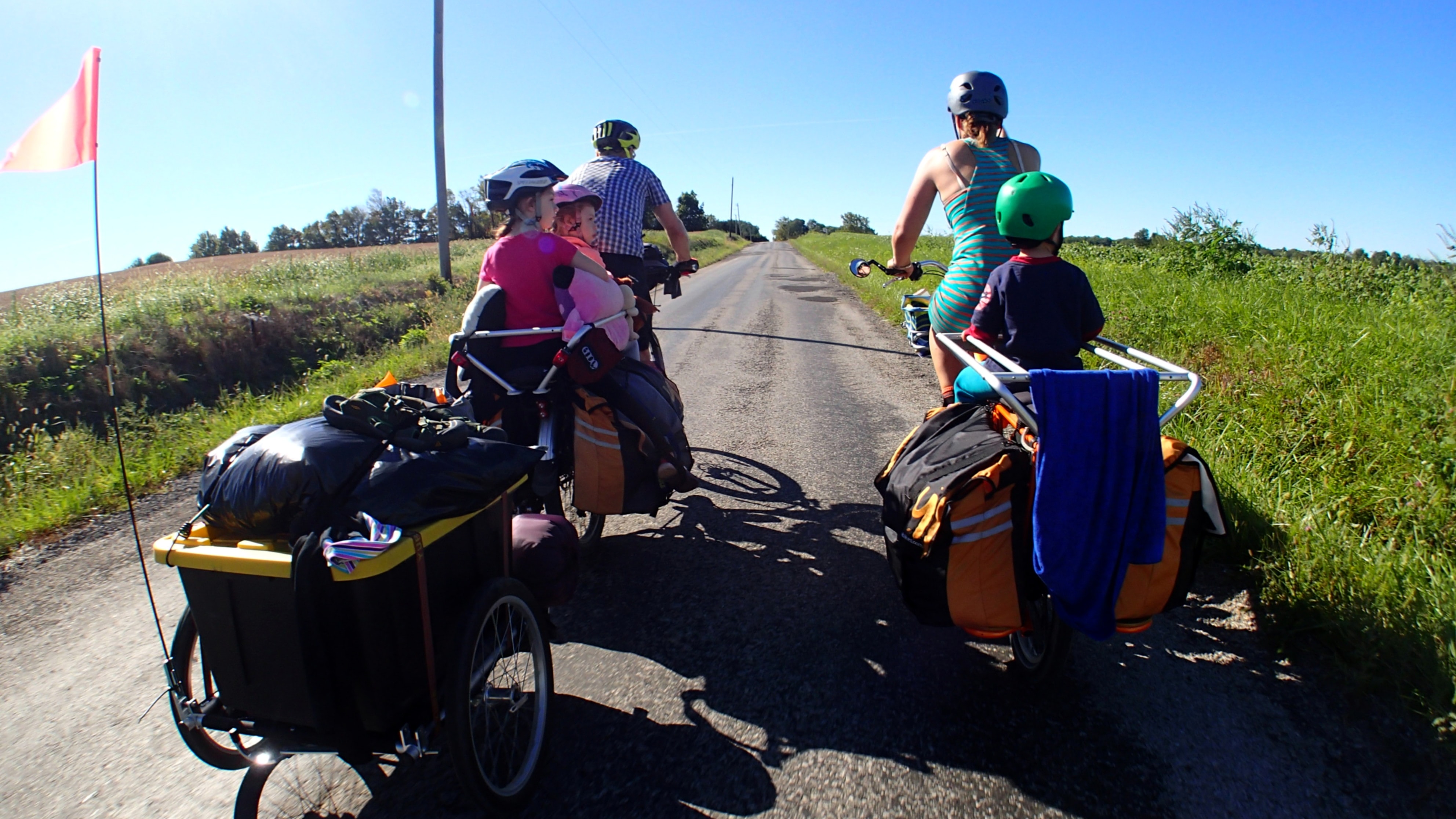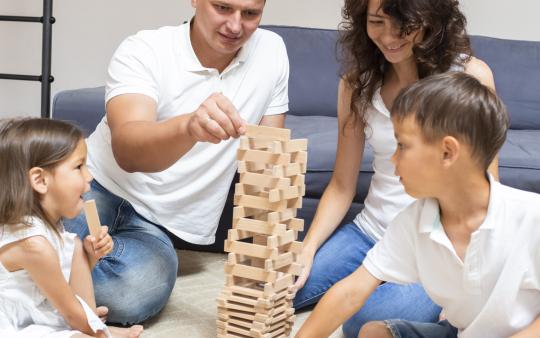When you have children with someone, you become a team for life. You or your partner may switch to other teams or quit altogether, but ideal teammates or not, you are still a team for your child. It can be challenging enough to figure out how to gel as a parenting team when together, but once you’ve separated or divorced, it can be infinitely more difficult to keep the team spirit alive.
When I was still married to the father of my children, our major source of disagreement was parenting. In the final stages of our marriage, when I knew separation was likely in the cards for us, I remember feeling relieved at the thought that I would finally get to parent my way - even if it was only half of the time. Relief was just a separation away. This would be the silver lining of the end of my marriage, right?
I could not have been more wrong.
As I entered the world of separation and co-parenting with a mess of conflict brewing all about, I had no idea that I was about to find out what it really takes to be a team player. It was about to become my life’s mission to find a way to keep the team together even though the dynamics had dramatically changed.
As a psychologist, you might think I had a head start. But that wasn’t the case. I was as deep in the muck of it as the next person. It was unfathomably difficult. About three months after separating from my children’s father, I realized I couldn’t go this alone. Fate delivered me a counselor who would challenge me to completely rethink how I was handling co-parenting. With her help, I faced the war within myself and struck out on a new way of dealing with my journey, one that placed my children on the winning side, instead of a losing one filled with uncertainty, insecurity, and conflict. These lessons weren’t just beneficial for me, but have also proven to be helpful in my clinical practice, where I can support families with their co-parenting teams so that everyone can win!
Everyone has defense mechanisms
It’s easy to make yourself crazy with thoughts of how challenging your partner can be. Why did he have to say that?! Why does she have to be so spiteful? Why are they so selfish? But the truth is, their behaviour is not their truth. Rather, it’s their “fabricated self” doing the best it can with the life contract it has been assigned. Though it may not always shine through, your partner’s true self is light and love and endless generosity—the true nature of all of us.
When you can understand that all of us carry forward defense mechanisms as a result of the caregiving experiences that affected our childhood, you can see your co-parent’s wounded inner child lashing out in survival. With compassion as your guide, you will be much more likely to respond with connection rather than throwing gasoline on the fire of conflict. And as connected experiences accumulate, the relationship recovers and can even begin to flourish over time.
The value of behavioural psychology
It can feel almost impossible to resist the urge to change your co-parent’s behaviours. If only you could show them how to speak more positively, or advise them on better recognizing your children’s needs, wouldn’t things be so much smoother? It never works out that way though. I have seen so many parents struggle with this, and have certainly lived this struggle myself.
It is never your role to change another’s behaviour. Rather, your focus must be to deeply understand what your co-parent’s behaviour has set off inside you. By understanding your own deeply hidden programming about dealing with conflict, you can begin to own and cherish your greatness, true power, and authentic self, putting yourself in a position to better approach the situation.
This doesn’t mean you can’t step in: just do so sparingly and judiciously, for only rarely will it actually be both appropriate and also from a place of awareness. In these special circumstances, you will have brilliant power to declare “enough” when that is the right thing to do.

A child's loyalty may wander
When the team breaks up, children often feel very torn in their loyalty. Sometimes they’ll be all about you; other times, they’ll be all about your co-parent. To make sense of why this happens, an understanding of two powerful dynamics is required. First, when you are in conflict with your co-parent, your child’s attachment brain becomes polarized and they are subconsciously forced to align themselves with one or the other. Second, if a child feels very insecurely attached to one parent, they will develop a subconscious loyalty to that parent from a desperate place of trying to hold on. In both cases, it isn’t personal - it is just how a child’s primal need for attachment works. Make your peace with wandering loyalty and know that staying the course with an open generosity about your co-parent to vaporize conflict and support relationship growth between them and your child is the way to go.
Disagreement and conflict resolution
Often in the experience of disagreement or conflict with our co-parent we become absolutely convinced that we know best. But how can we know for sure that our “best” is truly better? A year ago, my co-parent wanted to take our children on a trip to a developing country. Of course, I fretted about the kids’ safety but reluctantly agreed to let them go. The boys came home full of tales of big adventures, some of which were epic failures, and were easy for me to blame on their father. But some were also amazing successes that I could choose to be thankful their father gave them the opportunity to experience. So then, do I let the perceived failures bolster a false sense of me being the “right” parent and him the “wrong” one? Is my desire to protect my boys just in their best interests, or is it a means to protect myself and ensure that good memories are only made with me? Am I the only parent capable of making good decisions for my children?
A tough lesson about fairness
In my own co-parenting journey, and in having supported hundreds of families through their co-parenting odysseys, I see so many parents get stuck at the idea of “fair.” It’s not “fair” if he gets more time than me. It’s not “fair” if lessons happen on her night with the kids and I get excluded. It’s not “fair” if decisions are made with the kids without involving me.
Brace yourselves for a tough lesson: there is no such thing as fair in co-parenting. Your definitive role as a parent is to ensure your children get the absolute best shot at life. That is what you signed up for when you became a parent. Stay focused on the needs of your children even if it means you feel like you are missing out. Do you think it serves your child for you to show up at that sports practice on her father’s night? If your kids are still nursing or needing the comfort you know only your co-parent can give them in the middle of the night, does it really serve them for you to demand equal access time before they grow out of that stage? Set your ego aside. Go to your truth. Fair is never truth. Fair is the ego’s game and nobody ever wins.
Define your own truth
One of the greatest challenges in co-parenting is to figure out how you define your truth. And I mean “capital T” truth which is guided by wisdom, rather than “little t” truth which is swayed by the factual-but-superfluous conditions of your present-moment reality.
To uncover your own truth, one of the most useful techniques is to hone in on the question of intent. If you are feeling conflicted about how to respond to, or to react in, a decision-making process with your co-parent, honestly consider your intent. Do you want to put your co-parent in their place, teach them a lesson, or one-up them? Or is it your intent to make something right for your child, have them experience a more peaceful existence, or make things a little easier for them? “Capital T” truth intentions always go the distance and will always be in the best interests of you, your children, and your co-parent.
Success factors in co-parenting are unique
Ultimately there is no set of rules or well-defined series of plays that will ensure your co-parenting team is a connected one. The definition of “success” from one co-parenting relationship to the next will be very different. I know people who have great co-parenting relationships who have never had to really work at it or even had to read an article like this. I know others who are brilliantly conscious and beautifully aligned in their relationship, even though it takes effort and work to make it be so. And sadly, I know many more who are waging a war within their co-parenting relationship—and as a result, have children who are suffering.
And then there are the people like me who are just working through it. Maybe there are no big happy co-parent family dinners, and phone calls are still kind of challenging. Or in-person conversations about anything loaded are almost unheard of and often go sideways and most of the decisions happen over email. It happens, even for my team, and yet, my boys are increasingly thriving.
It doesn’t need to actually be perfect for it to be perfect for you. The perfection comes in accepting all the lessons and in knowing that peace in the co-parenting relationship comes from within. It is all about energy. Your energy and the thoughts you put out into the space between you and your co-parent. It takes only one person to fill that space with love. So be that one person.
Every day as part of my commitment to my family, I “join” with my children’s father. I meditate on this. I connect with him in my mind. I see through every behaviour to his truth. I honour his role as my children’s father no matter what. I walk alongside him, if only in my mind, as his support and his champion because if he succeeds, our kids succeed. I step in from time to time when carefully considered and appropriate. And we all journey on.
One day about a year ago, one of my children told me how much it pleases him that I love his dad. He said it with such softness in his eyes and from such an earnest space in his heart. It was a poignant confirmation that he and his brother are indeed being bathed every day in the energy of my intention and what it puts out into the field in which they grow. It has not been easy. And yet, I would live every day of it over and over again for our boys to know that feeling. The feeling of their family, in whatever form it exists, being a connected one because the co-parenting team is a connected one, even if only in spirit.
You may also enjoy: The Emotional Roots of Anxiety in Children, Simplicity Parenting in a World that Asks Too Much, and Creating A Conscious Relationship with Your Child.






